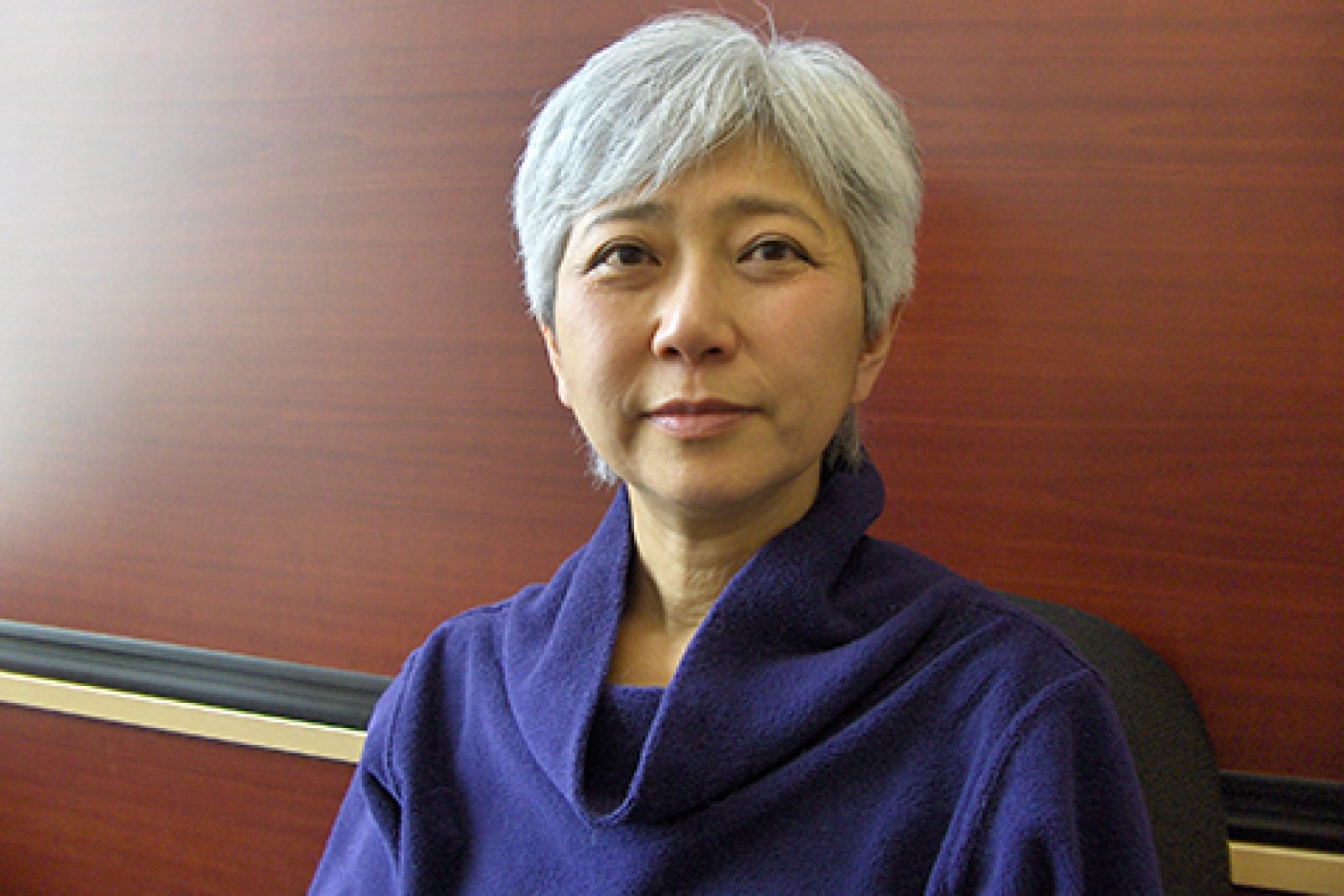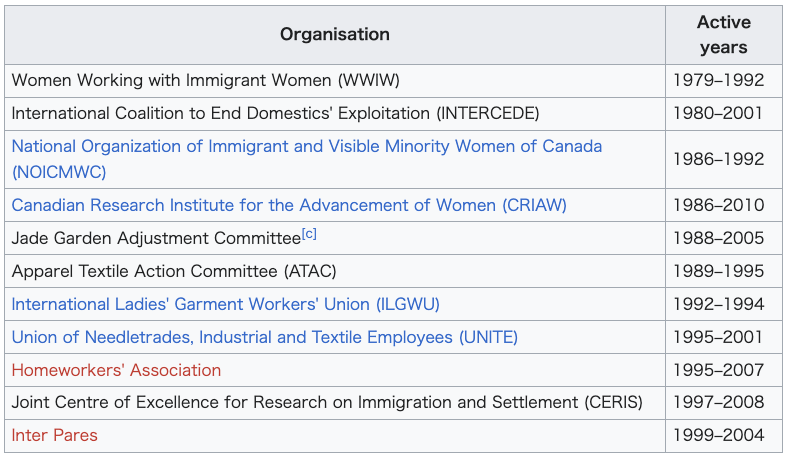
ロクサーナ・ン
Roxana Ng, 1951-2013

From In Memoriam: Roxana Ng, Photo by Todd Will
☆ ロクサーナ・チューイー・ン(1951年~2013年)は、公正な移民労働、ジェンダーおよび人種平等、脱植民地化教育の活動家であり研究者であった。 彼女は、カナダの衣料産業と移民、ジェンダー、人種、階級との関係についての研究で知られ、また、制度民族誌学、身体化された学習、批判的教育学への貢献 でも知られている。 ン氏は香港のダイアモンド・ヒルで育ち、1970年に両親と2人の兄弟とともにカナダのバンクーバーに移住した。社会学を学び、ニューブランズウィック大 学、クイーンズ大学、オンタリオ教育研究所(OISE)で教鞭をとった。社会学、成人教育、地域開発を教え、OISEの女性教育研究センター(2009年 ~2013年)の所長を務めた。 1970年代半ば以降、Ngは移民女性や縫製労働者の組織化に積極的に関わった。彼女の活動は、トロントにおける在宅ワーカーの保護を求める運動に影響を 与えた。特に、彼女はInter Paresの理事、そしてカナダ女性研究機構(CRIAW)の理事および会長(1994年~1995年)を務めた。
| Roxana Chu-Yee Ng
(1951–2013) was an activist and scholar for fair migrant labour, gender
and racial equality, and decolonising pedagogy. She is noted for her
research on the garment industry in Canada and its relation to
immigration, gender, race, and class, as well as her contributions to
institutional ethnography, embodied learning and critical pedagogy. Ng grew up in Diamond Hill, Hong Kong, and immigrated with her parents and two brothers to Vancouver, Canada in 1970. She trained in sociology and taught at the University of New Brunswick, Queen's University, and the Ontario Institute for Studies in Education (OISE). She taught sociology, adult education, and community development, and directed the OISE Centre for Women's Studies in Education (2009–2013). Ng was active in immigrant women's and garment workers' organising from the mid-1970s onwards. Her work informed advocacy for the protection of homeworkers in Toronto. Notably, she served as a board member of Inter Pares, and as board member then President (1994–95) of the Canadian Research Institute for the Advancement of Women (CRIAW). |
ロクサーナ・チューイー・ン(1951年~2013年)は、公正な移民
労働、ジェンダーおよび人種平等、脱植民地化教育の活動家であり研究者であった。
彼女は、カナダの衣料産業と移民、ジェンダー、人種、階級との関係についての研究で知られ、また、制度民族誌学、身体化された学習、批判的教育学への貢献
でも知られている。 ン氏は香港のダイアモンド・ヒルで育ち、1970年に両親と2人の兄弟とともにカナダのバンクーバーに移住した。社会学を学び、ニューブランズウィック大 学、クイーンズ大学、オンタリオ教育研究所(OISE)で教鞭をとった。社会学、成人教育、地域開発を教え、OISEの女性教育研究センター(2009年 ~2013年)の所長を務めた。 1970年代半ば以降、Ngは移民女性や縫製労働者の組織化に積極的に関わった。彼女の活動は、トロントにおける在宅ワーカーの保護を求める運動に影響を 与えた。特に、彼女はInter Paresの理事、そしてカナダ女性研究機構(CRIAW)の理事および会長(1994年~1995年)を務めた。 |
| Life Early years Roxana Ng was born in 1951 in Diamond Hill, a hill in the east of Kowloon Walled City in Hong Kong which used to be a large urban squatter village.[a] In 1968, she left to attend The Mount School, a Quaker boarding school in York, England.[1][2] There, she was asked to change her name from Ng to Wu (the Mandarin translation) to make pronunciation easier for native English speakers. Ng refused.[2] After graduation in 1970, she moved to Vancouver with her family.[1] When they immigrated, Ng kept her last name; the rest of her family took on the Mandarin translation ("Wu").[2] Education and teaching Ng trained in sociology at the University of British Columbia for her Bachelor's and Master's degrees.[1][2] During her final years of study in Vancouver, Ng dedicated a large portion of her time to caring for family during her mother's sickness.[2] In 1977, she co-founded Vancouver Women's Research Centre (VWRC), an independent feminist organisation known for its participatory approach to research.[1][2][3] Participatory research emphasises "knowledge for action" (in order to help resolve the problem being researched) and self-awareness on the part of the researcher as a participant with power and influence in research settings.[4][b] VWRC was "founded on the principle that all research on women must start with women and must include their perception on the project, the parameters, the process, and the questions raised". VWRC's work helped identify and address problems faced by women—particularly immigrant women—in economic development, domestic violence, and sexual harassment.[1][3] Its publications included a report (1980) on sexual harassment in the workplace undertaken in collaboration with the British Columbia Federation of Labour.[5] Ng went on to set up similar centres for immigrant women across Canada.[1] In 1978, Ng moved to Toronto for her PhD at Ontario Institute for Studies in Education (OISE), which she received in 1984.[1] She was mentored by Dorothy E. Smith, and became involved with Women Working with Immigrant Women (1979) and INTERCEDE (1980) during this time.[6][7][8][9] In the years that followed, Ng taught at the University of New Brunswick and Queen's University. She returned to OISE in 1988 as professor, first teaching sociology and later, adult education and community development.[1][2][10] Ng directed the Centre for Women's Studies in Education (CWSE) from 2009 to 2013.[11] Death On January 12, 2013, Ng passed away at Sunnybrook Hospital in Toronto, Ontario after a short and courageous fight with cancer. She left behind her parents and two brothers.[12] |
人生 幼少期 ロクサーナ・ンは1951年、香港の九龍城砦の東にある丘陵地帯、ダイヤモンド・ヒルで生まれた。かつては大規模な都市不法占拠地であった。[a] 1968年、彼女はイギリス、ヨークのクエーカー教徒の寄宿学校であるマウント・スクールに入学するためにそこを離れた。[1][2] そこで彼女は、英語話者にとって発音しやすいように、名前をンからウー(マンダリン語訳)に変えるよう求められた。ンは拒否した。[2] 1970年に卒業後、彼女は家族とともにバンクーバーに移住した。[1] 一家が移住した際、ンは自身の姓を維持し、他の家族はマンダリン語の「ウー」姓に変更した。[2] 教育と教授 Ngはブリティッシュコロンビア大学で社会学を学び、学士号と修士号を取得した。[1][2] バンクーバーでの学生生活の最後の数年間、Ngは母親の看病に多くの時間を費やした。 1977年、彼女は参加型アプローチで知られる独立フェミニスト団体、バンクーバー女性研究センター(VWRC)を共同設立した。参加型研究では、「行動 のための知識」(研究対象の問題解決に役立てるため)と、 研究者の側が、研究の現場において権力と影響力を持つ参加者であるという自己認識を強調している。[4][b] VWRCは、「女性に関するすべての研究は、女性から始め、そのプロジェクト、パラメータ、プロセス、および提起された質問に対する女性の認識を含めなけ ればならない」という原則に基づいて設立された。VWRCの活動は、経済発展、家庭内暴力、セクハラといった問題に直面する女性、特に移民女性の問題の特 定と解決に役立った。[1][3] その出版物には、ブリティッシュコロンビア労働組合連盟との共同作業による職場でのセクハラに関する報告書(1980年)が含まれている。[5] その後、Ngはカナダ全土の移民女性を対象とした同様のセンターを設立した。[1] 1978年、Ngは博士号取得のためオンタリオ教育研究所(OISE)のあるトロントに移り、1984年に博士号を取得した。[1] 彼女はドロシー・E・スミスに師事し、この時期に「移民女性と共に働く女性たち(1979年)」と「INTERCEDE(1980年)」に関わるように なった。[6][7][8][9] その後、ニューブランズウィック大学とクイーンズ大学で教鞭をとった。1988年にOISEに教授として戻り、当初は社会学を教え、後に成人教育と地域開発を教えた。 2009年から2013年まで、女性教育研究センター(CWSE)の所長を務めた。 死去 2013年1月12日、オンタリオ州トロントのサニーブルック病院で、Ngは癌との短い闘病生活の末に亡くなった。彼女の両親と2人の兄弟が残された。[12] |
| Scholarship and activism Scholarship Ng is noted for her scholarship on the garment industry in Canada and its relation to immigration, gender, race, and class, as well as her contributions to institutional ethnography, embodied learning, and critical pedagogy.[2][11] One major strand of her work documented the experiences of migrant women in Canada and their identity construction in a globalised world and labour market.[1][13][14] Another strand of her work sought insight from Eastern philosophy and practice to integrate the mind-body-spirit segregation (often assuming Cartesian mind-body duality) characteristic of traditional academia and higher education.[1][15] Ng has also written on the experience of academia from the standpoint of a minority, immigrant woman.[16] Ng's 1999 study, conducted on 30 Chinese-speaking homeworkers, found that wages were frozen at early 1980s levels (below minimum wage for homeworkers); none were receiving overtime pay (instead being paid per piece); and all reported work-related injuries. Ng estimated that there were around 8,000 women, many of them from Asia, who were homeworkers in the Toronto garment industry.[17][18][19] These homeworkers, who were paid by the piece, "regularly ha[d] their piece rate reduced as their productivity increase[d]". Many garments sewn by homeworkers "[did] not have retail and manufacturing labels, making their employers difficult to trace and regulate", such that only two of the 30 interviewed workers reported labels on garments. The study was cited at a press conference at Queen's Park.[20] In a "representative (if non-exhaustive)" review of Ng's scholarship which contextualises and connects the major strands of Ng's work, Elaine Coburn has considered Ng "one of Canadian sociology and political economy’s most underappreciated theorists" whose research and theorising "was and remains relatively marginalised within more mainstream academic publications".[16] In regard to the unity of Ng's scholarship and activism, Coburn wrote:[21] Ng’s work is motivated by a commitment to socially just change. Arguably, this commitment informed her efforts towards analytical rigour and clarity, since the stakes of social change do not allow for sloppy analyses that might mislead solidarity work with and for the exploited and oppressed. This rigour included a reflexive awareness of the personal costs of social change, since struggles with and for dominated actors inevitably face the countervailing powers of dominant actors whose interests are threatened by the possibilities of fundamental social transformation. Sometimes, Ng observed, even forms of civility are dangerous for social change, as when empathetic desires to maintain harmonious relationships with “those close to us” lead us to mute our critiques of social justice (Ng, 1993, p.200). Likewise, Ng examined the ways that dominated actors–and even we who think of ourselves as working for social justice–may reproduce unjust inequalities and relations of exploitation, despite our best intentions. |
奨学金と社会活動 奨学金 Ngは、カナダの衣料産業と移民、ジェンダー、人種、階級との関係に関する研究で知られ、また、組織民族誌学、身体化された学習、批判的教育学への貢献で も知られている。[2][11] 彼女の研究の主要なテーマのひとつは、カナダにおける移民女性の経験と、グローバル化した世界と労働市場における彼女たちのアイデンティティの形成を記録 することである。[1 ][13][14] また、別の研究では、従来の学問や高等教育に特徴的な心身分離(デカルト的な心身二元論を前提とする場合が多い)を統合するために、東洋哲学や実践から洞 察を得ようとした。[1][15] また、マイノリティである移民女性の立場から学問の経験について執筆している。[16] 1999年に実施された、中国語話者の在宅ワーカー30人を対象とした研究では、賃金が1980年代初頭の水準(在宅ワーカーの最低賃金以下)で凍結され ていること、残業代を受け取っている人はおらず(代わりに出来高払いで支払われている)、全員が仕事に関連した怪我を報告していることが判明した。Ng は、トロントの衣料品業界で在宅ワーカーとして働く女性は約8,000人おり、その多くはアジア出身者であると推定している。[17][18][19] 出来高払いで賃金が支払われるこれらの在宅ワーカーは、「生産性が向上するにつれ、定期的に出来高賃金が引き下げられていた」。在宅ワーカーが縫製した衣 類の多くは「小売および製造ラベルがなく、雇用主を追跡し規制することが困難」であり、インタビューを受けた30人の労働者のうち、衣類にラベルが付いて いたと報告したのは2人だけだった。この研究はクイーンズ・パークでの記者会見で引用された。 Ngの研究を「網羅的ではないにしても代表的な」観点から概観し、Ngの研究の主要な流れを文脈化し、関連付けたElaine Coburnは、Ngの研究と理論化は「より主流の学術出版物の中では、過去も現在も相対的に疎外されたもの」であり、Ngは「カナダの社会学および政治 経済学において最も正当に評価されていない理論家の一人」であると述べている。[16] Ngの研究と活動の統一性について、Coburnは次のように書いている。 ウングの研究は、社会正義の実現という強い意志に動機づけられている。おそらく、この強い意志が、分析の厳密性と明瞭さへの努力を促したのだろう。なぜな ら、社会変革の成否は、搾取され抑圧された人々との連帯を誤らせかねないずさんな分析を許さないからだ。この厳格さには、社会変革の個人的な代償に対する 内省的な認識も含まれていた。なぜなら、支配される側の人々との闘争や、彼らのための闘争は、必然的に、根本的な社会変革の可能性によって自らの利益が脅 かされる支配者側の勢力との対立を招くからだ。時に、Ngが観察したように、社会変革にとって礼儀正しさの形さえも危険である。「身近な人々」との調和的 な関係を維持したいという共感的な願望が、社会正義への批判を黙殺する結果につながる場合がある(Ng, 1993, p.200)。同様に、Ngは、支配的なアクター、そして社会正義のために働いていると自負する私たち自身でさえ、最善の意図にもかかわらず、不公正な不 平等や搾取関係を再生産してしまう可能性について検討した。 |
| Organising work Ng was active in immigrant women's and garment workers' organising from the mid-1970s onwards, and "continue[d] to refine her conceptualization of race, gender, and class relations based on her organizing experiences."[22] Notably, she served as a board member of Inter Pares, and as board member then President (1994–95) of the Canadian Research Institute for the Advancement of Women (CRIAW).[1] The organisations she supported included:[6]  |
組織化活動 ンは1970年代半ば以降、移民女性や衣料品労働者の組織化活動に積極的に関わり、「組織化の経験に基づいて、人種、ジェンダー、階級関係に関する自身の 概念を洗練し続けた」[22]。特に 彼女はInter Paresの理事を務め、またカナダ女性進歩研究所(CRIAW)の理事、そして1994年から1995年にかけては同研究所の所長も務めた。[1] 彼女が支援した組織には以下が含まれる。[6]  |
| "Decolonizing
Teaching and Learning Through Embodied Learning: Toward an Integrated
Approach." In Sharing Breath: Embodied Learning and Decolonization,
edited by Sheila Batacharya and Yuk-Lin Renita Wong. Edmonton:
Athabasca University Press, 2018. doi:
10.15215/aupress/9781771991919.01 (Open Access - CC BY-NC-ND 4.0) "Lifelong Learning as Ideological Practice: An Analysis from the Perspective of Immigrant Women in Canada." International Journal of Lifelong Education 29, no. 2 (2010): 169–184. doi: 10.1080/02601371003616574 "Toward an Integrative Approach to Equity in Education." In Pedagogies of Difference: Rethinking Education for Social Justice, 197–210. New York: Routledge, 2003. doi: 10.4324/9780203465547 "Integrating Community Diversity in Toronto: On Whose Terms?" In The World in a City, edited by C. Michael Lanphier and Paul Anisef, 373–456. Toronto: University of Toronto Press, 2003. "Toward an Embodied Pedagogy: Exploring Health and the Body through Chinese Medicine." In Indigenous Knowledges in Global Contexts: Multiple Readings of Our World, edited by George J. Sefa Dei, Budd L. Hall, and Dorothy Goldin Rosenberg, 168–183. Toronto: University of Toronto Press, 2000. The Politics of Community Services: Immigrant Women, Class and the State. 2nd ed. Halifax: Fernwood Publishing, 1996. (Available through Internet Archive's Open Library) Anti-Racism, Feminism, and Critical Approaches to Education, edited by Roxana Ng, Pat Staton, and Joyce Scane. Westport: Bergin & Garvey, 1995. (Available through Internet Archive's Open Library) "Racism, Sexism, and Nation Building in Canada." In Race, Identity, and Representation in Education, edited by Cameron McCarthy and Warren Crichlow, 50–59. 1st ed. New York: Routledge, 1993. (Available through Google Books) "A Woman Out of Control: Deconstructing Sexism and Racism in the University." Canadian Journal of Education / Revue canadienne de l'éducation 18, no. 3 (Summer 1993): 189–205. doi: 10.2307/1495382 Community Organization and the Canadian State, edited by Roxana Ng, Gilian Walker, and Jacob Muller. Toronto: Garamond Press, 1990. (Available through Internet Archive's Open Library) Immigrant Housewives in Canada: A Report. Toronto: Immigrant Women's Centre, 1981. |
「身体化された学習による脱植民地化された教授と学習: 統合的アプローチに向けて。」『Sharing Breath: Embodied Learning and Decolonization』シーラ・バタチャリア、ユック・リン・レニータ・ウォン編。エドモントン:アサバスカ大学出版、2018年。doi: 10.15215/aupress/9781771991919.01(オープンアクセス - CC BY-NC-ND 4.0)[pdf] 「生涯学習としてのイデオロギー的実践:カナダにおける移民女性の視点からの分析」『生涯教育国際ジャーナル』第29巻第2号(2010年):169-184。doi: 10.1080/02601371003616574 「教育における公平性への統合的アプローチに向けて」『差異の教授法:社会正義のための教育の再考』197-210ページ。ニューヨーク:Routledge、2003年。doi: 10.4324/9780203465547 「トロントにおけるコミュニティの多様性の統合:誰の条件によるのか?」『都市の中の地球』C.マイケル・ランフィアとポール・アニセフ編、373-456ページ。トロント:トロント大学出版、2003年。 「身体化された教育法を目指して:中国医学を通して健康と身体を探求する」『グローバルな文脈における土着の知識:私たちの世界の多様な解釈』ジョージ・ J・セファ・デイ、バッド・L・ホール、ドロシー・ゴールドン・ローゼンバーグ編、168-183ページ。トロント:トロント大学出版、2000年。 『コミュニティサービスの政治学:移民女性、階級、国家』第2版。ハリファックス:Fernwood Publishing、1996年。(インターネットアーカイブのOpen Libraryで入手可能) 『反人種主義、フェミニズム、教育への批判的アプローチ』ロクサーナ・ング、パット・ステイトン、ジョイス・スケイン編。ウェストポート:Bergin & Garvey、1995年。(インターネットアーカイブのOpen Libraryで入手可能) 「カナダにおける人種主義、性差別、国民形成」キャメロン・マッカーシーとウォーレン・クリッチロー編『教育における人種、アイデンティティ、表現』第1版、50-59ページ。ニューヨーク:ルートレッジ、1993年。(Googleブックスで入手可能) 「制御不能な女性:大学における性差別と人種主義の解体」『カナダ教育ジャーナル』18巻3号(1993年夏):189-205。 『コミュニティ組織とカナダ国家』、ロクサーナ・ング、ギリアン・ウォーカー、ジェイコブ・ミュラー編。トロント:ガラモンド・プレス、1990年。(インターネット・アーカイブのオープン・ライブラリーで入手可能) 『カナダにおける移民主婦:報告書』。トロント:移民女性センター、1981年。 |
| https://en.wikipedia.org/wiki/Roxana_Ng |
|
リ ンク
文 献
そ の他の情報
Copyleft, CC, Mitzub'ixi Quq Chi'j, 1996-2099
☆
 ☆
☆